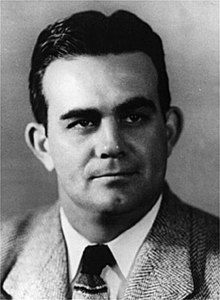 | |
| Biographical details | |
|---|---|
| Born | October 4, 1917 Kingston, Tennessee, U.S. |
| Died | January 21, 1969 (aged 51) Sweetwater, Tennessee, U.S. |
| Playing career | |
| 1936–1938 | Tennessee |
| 1943 | Del Monte Pre-Flight |
| Position(s) | End |
| Coaching career (HC unless noted) | |
| 1939–1941 | Mississippi State (assistant) |
| 1946 | Mississippi State (assistant) |
| 1947–1952 | Wyoming |
| 1953–1954 | Arkansas |
| 1955–1962 | Tennessee |
| 1964–1965 | Oklahoma State (assistant) |
| Administrative career (AD unless noted) | |
| 1962–1963 | Tennessee |
| Head coaching record | |
| Overall | 99–56–5 |
| Bowls | 2–2 |
| Accomplishments and honors | |
| Championships | |
| 2 Skyline Six / Skyline (1949–1950) 1 SWC (1954) 1 SEC (1956) | |
| Awards | |
| |
| College Football Hall of Fame Inducted in 1972 (player), 1997 (coach) (profile) | |
Clarence Bowden Wyatt (October 4, 1917 – January 21, 1969) was an American football player and coach. Wyatt played college football at the University of Tennessee and was later the head football coach at three schools, the University of Wyoming (1947–1952), the University of Arkansas (1953–1954), and his alma mater, Tennessee (1955–1962). He compiled a 99–56–5 record in 16 seasons as a head coach.[1]
In Wyoming, Wyatt turned around a team that had struggled under previous coach Bunny Oakes and had operated intermittently in the previous years because of World War II. His turnaround plan involved a round-the-clock training regimen, one that defensive back Marv Levy would later note did not allow players adequate time to complete their academic studies (leading Levy to transfer to Coe College). Wyatt's plan would secure Wyoming a perfect season and a win in the 1951 Gator Bowl.[2][3]
Wyatt's most notable victory at Tennessee came on November 7, 1959, when his Tennessee Volunteers football Volunteers upset top-ranked LSU, 14–13, by stopping a two-point conversion attempt by eventual Heisman Trophy winner Billy Cannon late in the game. The victory ended the Tigers' 18-game winning streak.[4]
Wyatt was elected to the College Football Hall of Fame in 1972 as a player and again in 1997 as a coach.[5][6]
- ^ "Bowden Wyatt College Coaching Records, Awards and Leaderboards". College Football at Sports-Reference.com. Retrieved March 14, 2024.
- ^ Tucker, Cody (April 15, 2021). "Some of the University of Wyoming's Best Have Called Buffalo Home". 7220 Sports. Townsquare Media. Retrieved September 12, 2022.
- ^ Shearer, John (October 21, 2020). "Find out about the former Tennessee football coach who lived in Sequoyah Hills". Knoxville News Sentinel. Retrieved March 14, 2024.
- ^ "LSU vs. Tennessee - Five memorable games". The Advocate. October 16, 2011. Retrieved March 14, 2024.
- ^ "Bowden Wyatt (1972) - Hall of Fame". National Football Foundation. Retrieved March 14, 2024.
- ^ "Bowden Wyatt (1997) - Hall of Fame". National Football Foundation. Retrieved March 14, 2024.